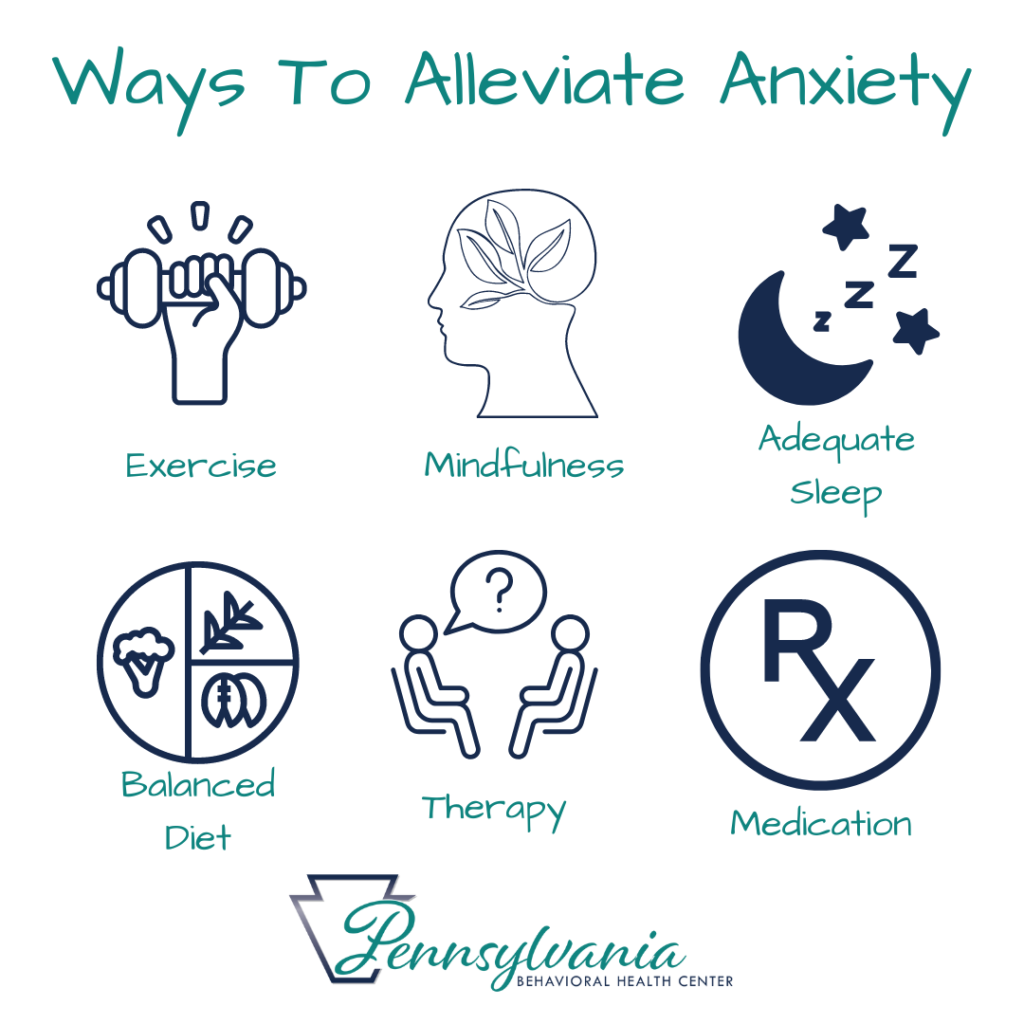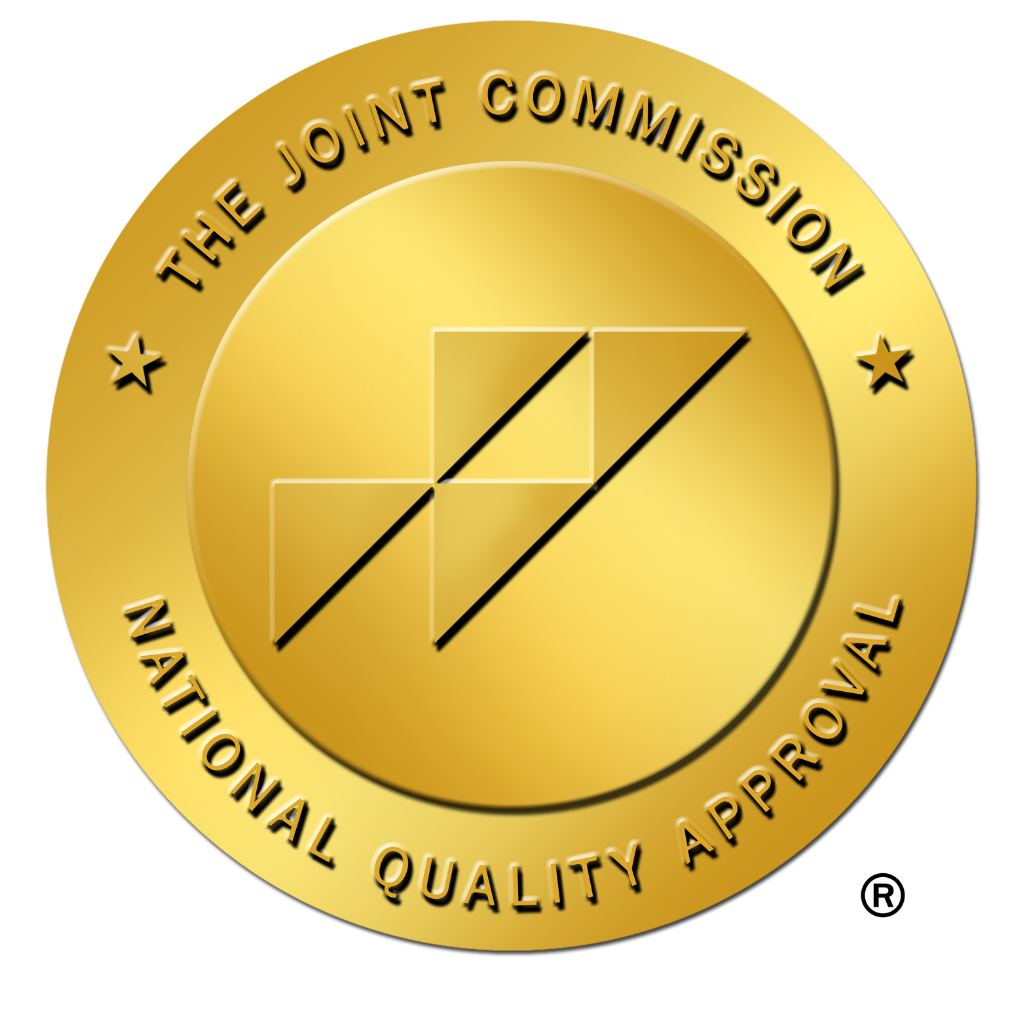Anxiety Treatment in Pennsylvania

What is Anxiety?
On this page, we will discuss anxiety treatment options and information in Pennsylvania. Anxiety also known as Generalized anxiety disorder (GAD) is a mental health condition characterized by excessive and persistent worry or anxiety about everyday life events and activities. It can affect anyone regardless of age, gender, or background. According to the Anxiety and Depression Association of America (ADAA), GAD affects approximately 6.8 million adults in the United States, making it one of the most common anxiety disorders.
Number of individuals who experience an anxiety disorder yearly
Symptoms of Anxiety
Anxiety is a normal response to stress, but it can become excessive or chronic and can interfere with daily activities. Anxiety disorders are the most common mental health disorders in the United States, affecting millions of adults. Anxiety disorders can include generalized anxiety disorder (GAD), panic disorder, social anxiety disorder, and specific phobias.
Anxiety can affect mental health by causing a range of symptoms such as:
- Constant worry and fear
- Racing thoughts
- Difficulty concentrating
- Irritability
- Insomnia
- Physical symptoms such as muscle tension, headaches, and fatigue
Anxiety can also lead to other mental health conditions such as depression, substance abuse, and personality disorders.
What kind of mental health therapies work on Anxiety?
There are several effective treatments for anxiety disorders, including:
- Cognitive-behavioral therapy (CBT): This type of therapy focuses on identifying and changing negative thought patterns and behaviors that contribute to anxiety.
- Medication: Antidepressant and anti-anxiety medications can be effective in reducing symptoms of anxiety, but should be prescribed and monitored by a healthcare professional.
- Acceptance and Commitment Therapy (ACT) : A form of therapy that helps individuals accept and acknowledge their thoughts, feelings, and experiences, rather than trying to change or suppress them
- Mindfulness-based therapies : such as mindfulness-based stress reduction (MBSR) and mindfulness-based cognitive therapy (MBCT) which help individuals learn to focus on the present moment and accept thoughts and feelings without judgment.
- Exposure therapy: This type of therapy involves gradually exposing the person to the source of their fear in a safe and controlled environment, which can help to reduce their fear over time.
What is the cause of Anxiety?
The exact cause of anxiety or GAD is not fully understood, but it is believed to be a combination of genetic, environmental, and psychological factors. People with a family history of anxiety disorders, those who have experienced a traumatic event, or those with a history of substance abuse may be more susceptible to developing GAD.
Statistics on Anxiety
Shocking statistics show that anxiety disorders are the most common mental illness in the United States, affecting 40 million adults or 18.1% of the population each year. In addition, only 36.9% of people with an anxiety disorder receive treatment. This highlights the importance of seeking help if you are experiencing symptoms of anxiety. Anxiety and anxiety disorders cost the United States more than $42 billion per year, making it the most costly mental health disorder. This includes costs related to psychiatric treatment, medication, hospitalization, and lost productivity. It highlights the significant impact that anxiety can have on individuals and society as a whole.
Can Anxiety be cured?
While anxiety or GAD cannot be cured completely it can be treated with a combination of medication and therapy. Antidepressant medications, such as selective serotonin reuptake inhibitors (SSRIs) and serotonin-norepinephrine reuptake inhibitors (SNRIs), are commonly used to reduce symptoms of anxiety. Benzodiazepines, a type of sedative medication, may also be prescribed for short-term relief of severe anxiety symptoms.
Treatment Options for Anxiety
There are several levels of care for anxiety in Pennsylvania, ranging from outpatient therapy to inpatient hospitalization. Here are some treatment options and levels of care for anxiety in Pennsylvania:
Outpatient therapy: This is the most common form of treatment for anxiety and involves meeting with a therapist on a regular basis to work on coping skills and strategies to manage anxiety. Some types of therapy that may be used include cognitive-behavioral therapy (CBT), mindfulness-based stress reduction (MBSR), and exposure therapy.
Intensive outpatient programs (IOP): IOPs are a step up from traditional outpatient therapy and involve more frequent and intense therapy sessions. They may also include group therapy and medication management.
Partial hospitalization programs (PHP): PHPs are a structured program that provides more intensive treatment than IOPs. Patients attend therapy and support groups during the day and return home at night.
Inpatient hospitalization: In severe cases, inpatient hospitalization may be necessary. This involves staying in a hospital or treatment center for a period of time to receive around-the-clock care and treatment for anxiety.
Medication management: In addition to therapy, medication may be prescribed to help manage anxiety symptoms. This may include antidepressants, benzodiazepines, or other medications that target specific symptoms.
Alternative therapies: Some people may benefit from alternative therapies, such as acupuncture, massage, or herbal supplements. These can be used in conjunction with traditional therapy and medication management.
It’s important to note that different treatments may work better for different people, and it may take some trial and error to find the most effective treatment. It’s always best to work with a mental health professional to determine the most appropriate treatment plan for an individual.
The highly trained mental health counselors at Pennsylvania Behavioral Health Center are experts in treating Anxiety. The center offers partial hospitalization, intensive outpatient, and psychiatry. If you or a loved one are in need of mental health treatment in Pennsylvania do not hesitate to call us at 610-563-2752.
Mental Health Resources for Anxiety
Here is a list of mental health resources on anxiety in Pennsylvania:
Pennsylvania Psychological Association (PPA): PPA is a professional organization for psychologists in Pennsylvania. They provide a directory of licensed psychologists in the state, as well as resources for finding mental health treatment.
Pennsylvania Department of Human Services (DHS): DHS provides a directory of mental health providers in Pennsylvania, as well as resources for finding mental health treatment.
National Alliance on Mental Illness (NAMI) Pennsylvania: NAMI Pennsylvania is a grassroots mental health organization that provides education, support, and advocacy for individuals and families affected by mental illness. They offer resources and support groups for those struggling with anxiety.
The Anxiety and Agoraphobia Treatment Center (AATC): AATC is a treatment center that specializes in anxiety disorders and agoraphobia. They offer a variety of treatment options, including outpatient therapy, IOP, and PHP.
Behavioral Wellness and Recovery: Behavioral Wellness and Recovery is a treatment center that provides mental health and substance abuse treatment. They offer an anxiety program that includes therapy, medication management, and alternative therapies.
American Psychological Association (APA) Psychologist Locator: The APA provides a nationwide directory of licensed psychologists, which can be filtered by location and specialty, including anxiety.
Mental Health Association in Pennsylvania: The Mental Health Association in Pennsylvania is a nonprofit organization that provides resources and support for individuals with mental health conditions, including anxiety. They offer support groups, education, and advocacy.
- Pennsylvania Behavioral Health Center – 610-563-2752
It’s important to note that this list is not exhaustive and there may be other mental health resources available in Pennsylvania for those struggling with anxiety. It’s best to speak with a healthcare professional or contact one of these organizations for more information on finding mental health treatment in Pennsylvania.
Mental Health Hotlines for Anxiety
Here is a list of hotlines for anxiety in Pennsylvania:
National Alliance on Mental Illness (NAMI) Pennsylvania Helpline: 1-800-223-0500. NAMI Pennsylvania provides a helpline for individuals struggling with mental health conditions, including anxiety. The helpline is staffed by trained volunteers who can provide information and support.
Crisis Text Line: Text PA to 741741. The Crisis Text Line provides free, 24/7 support via text message. Individuals can text in to receive support from trained crisis counselors.
Suicide Prevention Lifeline: 1-800-273-TALK (8255). The Suicide Prevention Lifeline provides free, 24/7 support for individuals struggling with suicidal thoughts, depression, and anxiety.
Substance Abuse and Mental Health Services Administration (SAMHSA) National Helpline: 1-800-662-HELP (4357). The SAMHSA National Helpline provides information and referrals for individuals struggling with mental health and substance abuse issues.
United Way of Pennsylvania Helpline: Dial 211. The United Way of Pennsylvania Helpline provides information and referrals for a variety of services, including mental health resources and support.
It’s important to note that if you or someone you know is experiencing a mental health crisis, it’s important to seek immediate help by calling 911 or going to the nearest emergency room. These hotlines can provide support and information, but are not a substitute for professional medical advice and treatment.
You Are Amazing and Worth it

Some common types of anxiety disorders include generalized anxiety disorder (GAD), panic disorder, social anxiety disorder, and specific phobias.
Effective treatments for anxiety may include therapy (such as cognitive-behavioral therapy or exposure therapy), medication (such as antidepressants or anti-anxiety medications), or a combination of both.
You can start by searching for therapists in your area who list anxiety as one of their specialties. You can also ask for recommendations from your primary care doctor or from friends or family members who have received treatment for anxiety. You can also call us at 610-563-2752 for help if needed.
Many insurance plans cover treatment for anxiety, including therapy and medication. However, coverage can vary depending on the plan and the specific treatment.
Yes, there are several support groups for people with anxiety in Pennsylvania, both in-person and online. Some resources for finding support groups include the Anxiety and Depression Association of America and Meetup.com.
Some strategies for managing anxiety on a day-to-day basis include practicing relaxation techniques (such as deep breathing or progressive muscle relaxation), staying physically active, getting enough sleep, avoiding caffeine and alcohol, and seeking support from friends and family members.
The length of treatment for anxiety can vary depending on the individual and the type and severity of the anxiety disorder. Some people may see improvement with just a few sessions of therapy, while others may need ongoing treatment for several months or even years.
Yes, it is possible to fully recover from an anxiety disorder with the right treatment and support. However, some people may continue to experience some symptoms of anxiety even after treatment, and ongoing management may be necessary.
What are some self care and lifestyle changes I can do for my Anxiety?
Here are some self-care techniques and lifestyle changes that can help manage anxiety in Pennsylvania:
Exercise regularly: Exercise is a natural way to reduce stress and anxiety. It releases endorphins, which are chemicals in the brain that help improve mood and reduce stress levels. Try to incorporate regular exercise into your routine, such as jogging, walking, or yoga.
Practice mindfulness: Mindfulness is a practice that involves focusing on the present moment and accepting your thoughts and feelings without judgment. It can help reduce anxiety and stress. There are many resources available in Pennsylvania for mindfulness practices, including apps, books, and classes.
Eat a healthy diet: A healthy diet that is rich in fruits, vegetables, whole grains, and lean protein can help reduce anxiety symptoms. Avoid processed foods, caffeine, and alcohol, which can increase anxiety levels.
Get enough sleep: Getting enough sleep is important for overall health and can help reduce anxiety symptoms. Aim for seven to eight hours of sleep per night and establish a consistent sleep schedule.
Seek social support: Talking to friends, family, or a mental health professional can help reduce anxiety symptoms. There are many support groups available in Pennsylvania for individuals with anxiety disorders.
Practice relaxation techniques: Relaxation techniques, such as deep breathing, meditation, and progressive muscle relaxation, can help reduce anxiety symptoms. There are many resources available in Pennsylvania for learning these techniques.
Reduce stress: Stress can trigger anxiety symptoms. To reduce stress, try to identify sources of stress and develop strategies for managing them, such as time management or delegation.
It’s important to note that self-care techniques and lifestyle changes can be helpful for managing anxiety, but they are not a substitute for professional medical advice and treatment. If you are struggling with anxiety, it’s important to speak with a healthcare professional or mental health provider for guidance and support.

